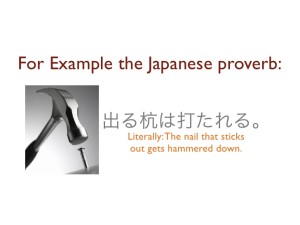A version of this post ran recently in the San Antonio Express News.
My wife and I recently renewed our home equity line of credit 1 with our bank.

When the notary at my bank had us in the room for 30 minutes busily initialing and signing many dozens of pages per a minute – pausing approximately 0.7 seconds per page – my mind began to explore the absurdity of it all.
Am I supposed to have read each page? Does this signature here actually compel my compliance with everything on the page? Really?
Hidden in the fine print of these documents, the bank probably slipped “And, henceforth I, Michael Taylor, by my signature below, do solemnly agree to wear a rubber ducky costume to work every day. Also I agree that my banker is the super-duper coolest person ever” and there’s no way I would have caught that in the fine print.
And yet, I signed. My cursive name must mean I agreed to it all. Yes, I agreed to whatever they wrote down there!
I’ve worked on many sides of the mortgage business for many years now, so I understand the point of this paperwork. To wit, the papers have zero to do with serving borrowers and 100 percent to do with creating a CYA paper trail – a paper trail that serves the lender, not me, if things go badly.
I get that.
I wish I didn’t have to participate in this charade of me ‘agreeing’ to something which I am unwilling to read thoroughly, that the bank knows I am not reading, and yet the bank also knows they can take me to court and win by arguing successfully that I agreed to all their terms, if I fail to comply with said terms.
We’ve all had that experience of mindlessly signing and initialing page after page of unread documents.
What do all those initials and signatures, the unreadable documentation, plus all of the regulatory morass that underpins it all, stand in the place of? Human judgment.
 Written rules substitute for our ability, or the bank’s ability, to make individual decisions specific to a situation.
Written rules substitute for our ability, or the bank’s ability, to make individual decisions specific to a situation.
But here’s the weird thing that I returned to in the midst of signing my name dozens of times in front of my notary: this dehumanization of the decision process is a good thing. This automated decision-making process works to our advantage.
We think we want our bankers to be able to use their judgment. But we really don’t.
We think we would all be better off if we had a banker, like George Bailey from It’s a Wonderful Life, who could look us in the eye and say: “Here’s a loan, Taylors, I trust you. Don’t worry about all that boring paperwork, your handshake is enough.”
We’d skip out of the bank buoyed by Banker Bailey’s great judgment and trust in our solid character.
To the extent that George Bailey’s world ever existed (it may have, or it may not have) I don’t think that was a better world for borrowers for at least for one important reason: Borrowing costs.
All the impersonal unreadable language assists in making mortgage loans like my HELOC (Home Equity Line of Credit, but you know that) one of the cheapest ways to borrow on this planet.
Banks do not really underwrite mortgage loans anymore. Instead, they originate mortgages for a fee, and then feed the mortgage bond investor system with similarly situated mortgage loans. To feed that system, every single mortgage or HELOC must conform precisely to the standards of bond investors.
The mortgage bond market attracts a billion of dollars of investment capital on a daily basis 2 to fund home ownership. That money invested in mortgages gets offered at rock bottom interest rates precisely because of the uniformity enforced inside a mortgage bond.
Any non-conformity in the mortgage underwriting process makes the loan ineligible for inclusion in a mortgage bond structure. “The nail that sticks out must be hammered down,” as the Japanese cliche goes.
With a signature missing here or an initial missing there, the bond structuring companies would kick our loan out, and the bank would get stuck with an inefficient product on their books, which is the last thing they want.
I’ve never worked in the Wal-Mart supply chain, but I’ve read about the incredibly strict standards by which suppliers must meet packaging specifications to get their stuff into Wal-Mart stores. Those inflexible standards help produce the rock-bottom Wal-Mart prices. Human judgment or flexibility with the rules would raise prices in Wal-Mart, just as it would for my HELOC.

When my wife and I signed our HELOC recently, we were the product being packaged for sale into the mortgage bond market. We got a great interest rate, and it only required an assembly-line approach to signing everything.
Please see related posts
Ask an Ex-banker – Home Equity Lines of Credit
Why You Hate Your Bank – Lack of Judgment
Post read (2383) times.
- By the way, home equity lines of credit are the bomb. Tangential to the following discussion, I believe home equity lines of credit – despite causing widespread financial destruction in 2008 – are the best invention since Nutella on toast. But that’s a discussion for another time and place. ↩
- How do I get that number, you ask? Great question. The US mortgage bond market added up to $8.7 Trillion in mortgage bonds at the end of 2014. At a weighted average coupon of 4.5% (I made that up but it feels average-y at this point) that would generate about a billion dollars in interest per day. Factoring in principal repayments the US mortgage bond market has to attract more than a billion dollars every day just to stay the same size. ↩





5 Replies to “Judgment vs Objectivity – My Recent HELOC Renewal”
I am convinced that the user agreements you click ‘agree’ on every time you join a new forum or use a new app all include language giving them the right to your first born should they ask.
That’s why I’ve fathered 27 children, because I have been forced to give away 25 of them. I’m keeping these last two though, whatever the user agreements tell me.
Would you say the problem with HELOCs are people who take them out before their mortgage is fully paid off? I think that is what got a lot of people in trouble in the mortgage crisis, equity stripping when they didn’t full own their home.
I got my HELOC even though I have a conventional 15yr fixed 1st mortgage with a significant balance still. I got a HELOC so that I can have ready money in case something big comes along (such as an amazing investment opportunity that requires the ability to pay cash, or a big tax bill, or some emergency thing) and I don’t want to sell something in order to be able to pay for it. In my case I’d use it if I had a plan to pay it off in a relatively short amount of time. Its definitely dangerous if used unwisely, but an awesome tool if used wisely.
To make up an example which isn’t exactly my intended use, but strikes me as fairly legitimate: If you had a $100K unused HELOC, and for some reason the little garage with an apartment across the street from you came on the market. You think its worth $130K, and also since its in your neighborhood you want it as either an AirBnB unit or a guest house, but the neighbor wants to sell quick, and he would sell it to you for $100K if he could get a quick sale, this week, essentially ‘for cash.’ Well, if you have the unused HELOC line, you can be that ‘cash buyer’ with the ability to write the check today. Then later, when it becomes an income-generating AirBnB unit for you, you can take the time to get the conventional mortgage loan or whatever for the unit and pay back your HELOC. Some variation on that theme is why I think HELOCs are a great, powerful, personal financial tool. But of course that same tool can blow up in your face, if used unwisely. Or if that particular market blows up. Everything has risk.
I know of someone who used home mortgages in a similar manner. He borrowed some money from an aunt, used it to by a home, bought the home for cash, then turned around and mortgaged the home from the bank to pay back the loan to his aunt. He then rented out the home to pay the monthly mortgage payments. He then turned around and took another loan from his aunt, bought another house, took out a mortgage on it, paid her back, wash, rinse, repeat. He was on his fifth home when I heard about what he was doing.
In you’re scenario, the HELOC is the well-off aunt making the loan.